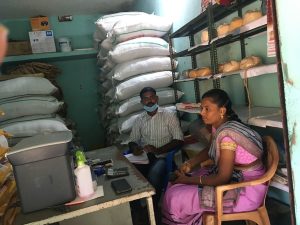What’s in it for a farmer to be a member of FPO?

Our year-long study on financial inclusion and FPOs (Farmer Producer Organisation) is reaching its conclusion. The study extensively researched 20 FPOs spanned across India through consented interviews of various stakeholders including the CEOs, BoDs (board of directors), member farmers and non-member farmers. This particular blog tries to take the reader through the lens of a non-FPO member farmer in the vicinity of one of the FPOs that participated in our research. He justified his staying away with “there is no substantial benefit being a member of the FPO”. While we were not ready to take it at face value, it did make us wonder: What benefits do farmers get from being a member of a FPO?
Due to limited access to hard data and specific information, it is difficult to measure financial benefits an individual farmer may receive, whether as members and non-members. Hence we tried to explore other yardsticks that may help measure the benefits that membership of a FPO may bring.
1. Information on Agro Practices:
Member farmers receive information on new agro-practices which encourage them to adopt new technologies. Of the 400 interviewees, 33.3 per cent member-farmers used solutions such drip irrigation to farm their land, whereas none of the non-member farmers used any modern technology.
2. Improved Access to Credit:
Member farmers had access to loans at lower rates of interest than non-member farmers. This was primarily because non-member farmers still preferred to borrow from money lenders (>50 per cent of the interviewees), while only <10 percent of member farmers took loans from money lenders. Additionally, in South India, the Farmer Interest Group (village level group of members of FPO) is also associated with SHGs (self-help groups). FPO members have explored SHGs as a source for borrowed funds during the agro season.
3. Access to Government Schemes:
Close to 70 per cent of member farmers had access to government agro-insurances and social security plans. For non-members, this figure was less than 40 per cent. In many states, Block Agriculture offices achieve their targets by directly reaching out to FPO. Thus at the grassroots level, the administrative machinery leveraged the FPOs to make welfare schemes easily accessible.
4. Going Digital:
Across the states, we found that with the increased popularity of smartphones and internet, member farmers are slightly more progressive and tech savvy. This may be attributable to increased use of digital tools by FPOs to on-board farmers and communicate with them. Furthermore, usage of debit cards for online and PoS (point of sales) purchases is slightly higher for member farmers.
5. Access to Choices:
Member farmers have greater access to choices — be it inputs, markets, or technology. Over and above the traditional connections available in their immediate geographies, member-farmers receive leads from and build connections through the FPO. At the end of the day, member-farmers have a greater range of choices.
Though measurement yardsticks developed and utilized by practitioners like us might be well-intended in their thoughts and actions but at the end of the day might be unfit in explaining ground realities from the perspective of the end beneficiaries.
From our interactions with organisations that fund and promote FPOs, and discussions with CEOs, board of directors, and members of FPOs and with non-members, we have reached the conclusion that while individual farmers may have access to information, there is very limited ‘shared understanding’ between the stakeholders.
Though using these five yardsticks to measure benefits from FPO membership may look credible in Indian conditions, unless every individual farmer perceives there are both tangible — in the form or monetary gains — and intangible benefits that they are receiving via FPOs, they are bound to remain sceptical about becoming a member of one, and keep raising the question, ‘What’s in it for me?’
This research was developed as part of the Bharat Inclusion Research Fellowship.
